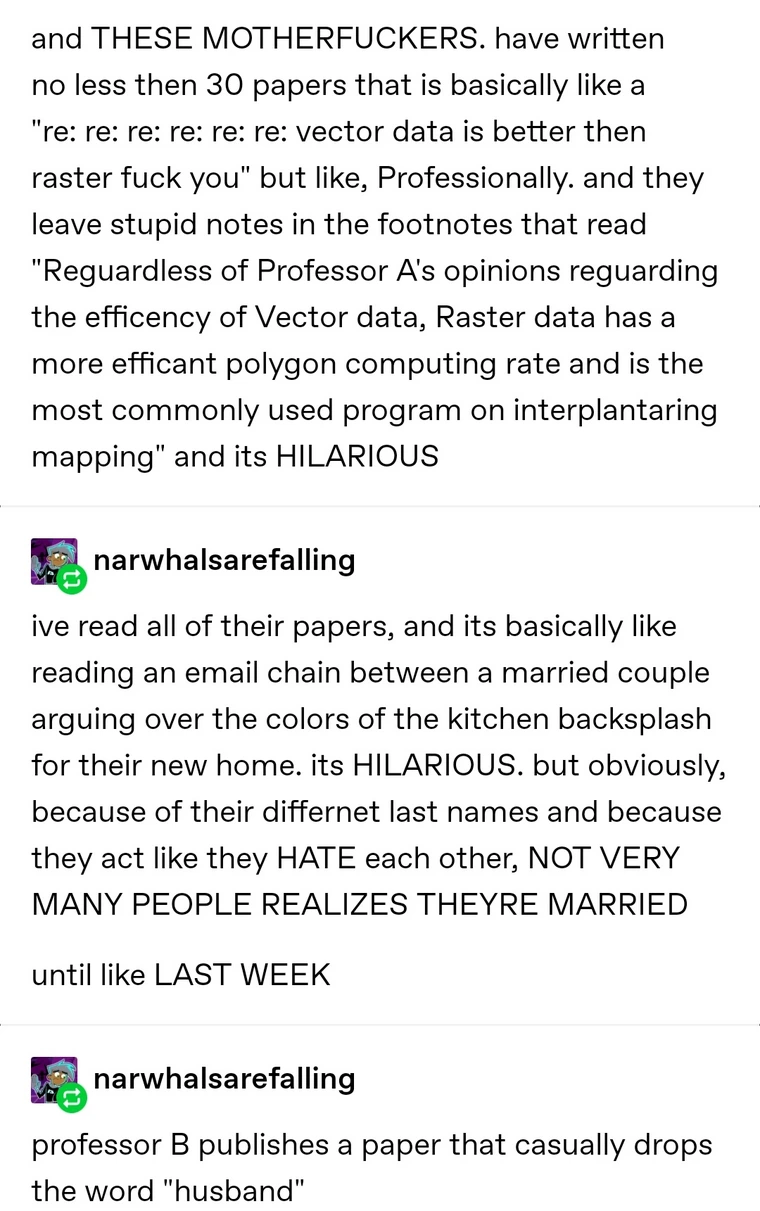
RIVELS
Geospatical, utalized, insistanting, …
Dyslexia or fake.
Not uncommon for stem majors to have poor English. My freshman brochure for my engineering college had “enlish 20”. Which I found ironic they misspelled the spelling class lmao
I have Grammarly installed on everything I can for a reason lmao.
deleted by creator
I run languagetool locally, and it’s actually really good, but the browser extension is closed source even though I can point it at a local server, I don’t know if it’s logging what I type.
But libreoffice has built in support, which is great.
I’m aware but I don’t care too much lol. It’s helped me quite a bit and you don’t want to see the alternative. I have enough trouble expressing myself, I’ll take the help as I can get it.
But why is uncommon for stem majors to proofread and use spell check?
You’d think these science-technology types would be all over that.
My late partner studied English as an undergrad and when he applied for his MA his email said “Please find attached my application for the MA in Creative Writning” and it makes me sad he’s no longer around for me to relentlessly mock him about it.
Insistanting, reguardless, reguarding, better then, differnet
I quite enjoy resting a thought upon the pronunciation of a misspelt word. Not to mock the occurrence of the mistake but to enjoy the novelty of the familiarly unfamiliar. Geospatically speaking it provides a moment’s grammatical geospatical sabbatical.
This is in a similar lexical vein to the recent Lemmy post about enjoying nich names.
I don’t know why I’m about to submit this reply as it’s utter nonsense…
Spelling is a poor indicator of competence.
While that may be true, it’s a reasonable indicator of a person’s capacity to hear new information and then incorporate that into practice. If they’ve been told that they’re spelling a word wrong but then either can’t integrate that new knowledge or actively choose not to follow it, you’ve got someone who is either wilfully ignorant or lacks some capacity to integrate new information. Either that, or dyslexia.
Also, it genuinely depends on the work you do. My role has me writing up anywhere between 5-10,000 words worth of reports per day - proper spelling and grammar is key for competence in this role. I’ve seen reports where seemingly innocuous spelling mistakes completely change the meaning of text. Writing ‘can’ instead of ‘can’t’ and vice versa is an immediate example that comes to mind. I know this is an engineering grad, but clear communication is important in every role that includes managers, teams or other stakeholders.
Dyslexia is pretty common. Written language wasn’t common among the human population till a few hundred years ago, using that as your measure of intelligence is a very poor fit. No it doesn’t say anything about their ability to incorporate new information. Judging people based on spelling is just not a good indicator for anything except for the very narrow task of spelling and doesn’t say anything meaningful about their intelligence in other areas. Using it as a way to discriminate in the workplace is especially bad as your are just being needlessly discriminatory to neurodivergent individuals. Neurodivergent people are constantly gatekept from promotions by neurotypicals for shallow surface indicators that actually have no bearing on their ability to perform in the role. It’s just ableism.
I never stated nor implied that spelling and grammar are a marker of intelligence - just a marker of being able to retain and use simple information. This was absolutely directed towards neurotypical people, and I probably should have mentioned dyslexia as an example of where this logic doesn’t follow.
It needs to be used to discriminate in fields that require abundantly clear communication urgently. I’m a child protection caseworker who does nothing but write up reports all day; if I had dyslexia I’d need serious accommodations to be able to perform the role at the level expected by the taxpayer who pays my salary. It absolutely can be done, but they’d likely need to hire a whole other person just to scribe. Have a look through my comment history; I’m well aware of dyslexia and its effects as I used to scribe for a friend in uni.
The thing is, all these words were used correctly. This isn’t a dumb person pretending to be in science, it’s just someone who can’t spell.
If this is real, you know they have better sex than any of us.
You guys have sex!?
With my hands
It’s lucky he’s the vector data guy because if she was in charge of aiming it in there’d be rounding errors
It’s fun trying to figure out what their dirty talk is like.
That is a good way to get citations, NGL.
I aspire to be that professor that’s married to their arch-academic-enemy
What a weird idea that there is any sort of rivalry between two data types used in the same science. I have a hard time believing that any geospatial science professor is in a war over this. Analogously this would be like two carpenters having a war over saws vs hammers. They are both indispensable tools in carpentry. Sometimes you saw something and then use a hammer on the next step, sometimes you hammer something and saw something next. It’s… You use both. You’ll always use both.
Great advertising though. Everyone that reads the letters will learn their names.
But someone making about as many spelling mistakes as there are words in the post should be the first red flag. This reads like someone who slept through an intro to GIS course, or someone who hates ESRI (based?) and wanted to simultaneously send their entire board of directors into seizures.
Anyway, QGIS gang 😎
okay SO, yeah, well, anyway, okay like, there’s this HILARIOUS RIVELRY going on between those two teachers I no and it’s all written DOWN in scientifatic PAPERS that are publicly available for anyone but I won’t LINK them because shirley my badly spelt TALE of what happened sprinkled with RANDOM capitalized WORDS is much more HILARIOUS than anybody readings it FOR themselves
WHERE IS PART 3 I NEED TO KNOW THE FALLOUT
I went hunting and found OOP’s blog. There isn’t much more to the story, which I will transcribe here:
until like LAST WEEK
professor B publishes a paper that casually drops the word “husband”
and obviously all the students are like “oh i didn’t know u were married!” because we read that shit like how white suburban mothers read People Magazine
and shes like “yeah, it’s Professor A”
and we all FLIPPED. THE FUCK. OUT
we thought the framed picture of the two of them on professor A’s desk was ironic because hes that type of guy
like, you gotta understand, these two have gotten into YELLING matches in hallways. these two refuse to go on trips with each other. but apparently they have a system where they quite LITERALLY leave all of their work at work and drive home in separate cars and literally NEVER work at home. it is SO funnyMan said “rivels” and “utalizied”
This comedy lost me at ‘literally’, because that’s how I know I don’t need to invest more time on it. Hey Skippy! Learn another adverb, okay?
I get that colleges are no longer failing papers with 3rd-grade spelling mistakes and comma splices at it ruins the uni’s bottom line. But I miss even when unis had just a little more pride in themselves.
The red zone is for immediate loading and unloading of passengers only, there is no parking in the white zone
Oh really, Vernon? Why pretend, we both know perfectly well what this is about. You want me to have an abortion.
It’s really the only sensible choice. If it’s done properly, therapeutically there’s almost no danger involved
It sounds sweet.
better then
than
Then than better than better then
I really hope you’re obfuscating the real thing they are fighting over because it makes zero sense that anyone would fight over which is “better”. Like, what? You… You have to use both like… All the time. I’ve never had a project outside of a class assignment that didn’t require both.
WTF
My domain is more bioinformatics than GIS, but the way I imagined it was that if one was arguing that [thing] data is better, they’re arguing that if more people recognised the innate benefits of [thing], we wouldn’t have to rely on software that uses [other thing] so much, and that to properly utilise [thing], it would take a bit of radical reworking of workflows, but there would be significant long term net benefit.
Basically, I think arguments like this tend to be more grounded in the socio-cultural practices of a research field than the absolute technical merits of an approach. Like in my domain, a DNA sequence is just a long sequence of 4 different letters (A, T, G & C), but there’s a bunch of ways we can encode that data into a file, many of which have trade-offs (and some of which are just an artifact of how things used to be done)
the spelling is atrocious in this ffs
They really are a geographer
I can oddly relate because I’m taking courses right now that deal with these data sets, GIS is a great field with lots of opprotunities that pays well even in entry positions. If anyone is curious, they should look it up. It can be used in soooo many different applications and fields, it’s very versatile.
My dad is a software developer for a popular GIS software. It’s just weird to see someone on Lemmy talking about GIS lol
ESRI or Q? There are not that many. 😂 There are several GIS adjacent communities on here. We get obsessive.
Digpro actually. It may not be popular in the US but it’s big in Europe/Scandinavia.
map nerds unite ✊
All I know about GIS is that there’s a plugin for Postgres called postGIS and it uses spatial coordinates.
Tease.
Keep your enemies close…
…and your spouse at icy remove.











